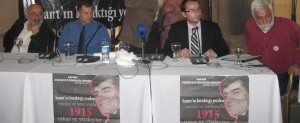In June and July 2010, Weekly editor Khatchig Mouradian presented a lecture titled “The Sound of Footsteps: Commemorating the Armenian Genocide in Turkey” in several cities and towns in Massachusetts, Illinois, California, Michigan, Rhode Island, and New Jersey. The article below, by Knarik O. Meneshian, is based on her impressions from the lecture held in Glenview, Ill.
“In Turkey you don’t have to look for the genocide, it’s right there—everywhere—staring you in the face…” When Khatchig Mouradian, editor of the Armenian Weekly, spoke these words at his recent lecture and slideshow presentation at the Shahnasarian Hall in Glenview, I momentarily glanced around me at the small audience. I recalled the first sounds the Chicago Armenian community made in 1975 as they gathered in downtown Chicago to commemorate April 24 and to demonstrate against the Turkish government. The crowd of Armenian marchers—men, women, and children—was huge. Their footsteps thundered and their voices roared, “Justice! We want justice!” Since those first footsteps were taken in this city and elsewhere, we, as a people, have accomplished much in the fight for genocide recognition throughout the world. As a result, the genocide of the Armenian people is no longer commemorated only in our churches, halls, and centers. As Mouradian recounted the commemorative events he had witnessed this past April in Turkey, as well as discussing the April 24, 2010, conference in Ankara he had participated in, he stated that for the first time, an “open-air” genocide commemoration took place in Turkey—the land where the unspeakable horrors were committed. The editor added that every Saturday weeping Kurdish women, holding red carnations, gather to remember family members who have “disappeared,” and every April 24, they also hold up photos of slain Armenian intellectuals.

Mouradian touched on the subject of stolen Armenian property and the Turkish Republic’s establishment on Armenian wealth, topics which had been discussed during the conference. He spoke on the issue of justice and stated, “Being an Armenian in Turkey and then talking about the genocide is a double crime.” Despite this, remarkably, an “open-air” genocide commemoration had taken place.
“The fate of genocide survivors is to constantly tell their stories,” explained the editor and gave the example of one survivor he had spoken with. “When she told her story she would stop, laugh, then say, ‘I am sorry, but I have run out of tears,’” Mouradian said. As he recounted the elderly woman’s story, I remembered Deegeen Takouhi, another genocide survivor, who had made her home in Chicago. She too was one of those whose tears had run out long ago, so when she told her story, laughter replaced the tears that once flowed. Whether teary-eyed or dry, the genocide survivors I have spoken to over the years have all had that same look in their eyes—the look of immeasurable loss and profound grief.
Before concluding his presentation, Mouradian briefly talked about his visit to Ani, where cow dung dots the crumbling cathedral and there is no mention of the Armenians. “I picked up stones at Ani to bring back home with me,” he said. What an image! What a poignant way for the editor to end his talk—“I picked up stones.” After all, stones are strong. Stones are enduring. Picturing the stirring scene he had just described, I glanced around me at the audience again and thought, “Too bad,” recalling how in years past presentations such as this one were attended in large numbers by the community, including the youth. Then, as I thought more about the stones, I could not help but think that although strong and enduring, without protection from the elements, time has a way of eroding stones, turning them into sand.
Let the sounds, “the footsteps of a rose-flooded dawn,” Daniel Varoujan heard and wrote of before that fateful day in 1915, never fade! Let the stones of Ani never turn to sand!


Truly a heartwarming piece.. it is also heartbreaking to know that not too many Armenians attended this forum.
However, as the article stated:
Let the sounds, “the footsteps of a rose-flooded dawn,” Daniel Varoujan heard and wrote of before that fateful day in 1915, never fade! Let the stones of Ani never turn to sand!
Let the Armenian love and passion never fade.. and stand strong like our beloved Catherdral Ani..
Gayane
I visited my daughter in Virginia,a jeweler was from istanbul(never give turks capitalization) he was Armenian.I said to him you are in America,You dont have to have those SCARED EYES anymore.It a force of habit, or again,some will always have them,others will not,a matter of choice.I was raised in America,never had them.Never worried about the jerks,I mean turks.